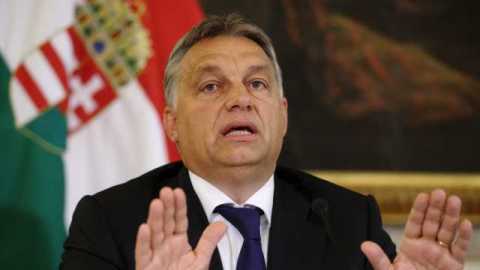
BUDAPEST, July 23 (Reuters) - The European Union needs a new strategy on the war in Ukraine as sanctions against Moscow have not worked, Hungarian Prime Minister Viktor Orban said on Saturday.
"A new strategy is needed which should focus peace talks and drafting a good peace proposal...instead of winning the war," Orban said in a speech in Romania.
Orban, reelected for a fourth consecutive term in April, reiterated that Hungary - a NATO member - would stay out of the war in neighbouring Ukraine.
He is facing his toughest challenge since taking power in 2010, with inflation in double digits, a weak forint and EU funds still held up amid a dispute with Brussels over democratic standards.
Orban has said before that Hungary is unwilling to support EU embargoes or limitations on Russian gas imports as that would undermine its economy, which is about 85% reliant on Russian gas imports.
He said in his speech that the Western strategy on Ukraine has been built on four pillars - that Ukraine can win a war against Russia with NATO weapons, that sanctions would weaken Russia and destabilise its leadership, that sanctions would hurt Russia more than Europe, and that the world would line up in support of Europe.
Orban said this strategy has failed as governments in Europe are collapsing "like dominoes", energy prices have surged and a new strategy was needed now.
"We are sitting in a car that has a puncture in all four tyres: it is absolutely clear that the war cannot be won in this way," Orban told his supporters.
He said Ukraine will never win the war this way "quite simply because the Russian army has assymetrical dominance".
Orban said there was no chance for peace talks between Russia and Ukraine.
"As Russia wants security guarantees, this war can be ended only with peace talks between Russia and America," he said.
THREAT OF RECESSION
Orban said the threat of economic recession loomed over entire Europe now which also posed a risk to Hungary's economy. Analysts project GDP growth will slow to about 2.5% next year.
"We must reach a new agreement with the European Union, these financial talks are underway and we will come to an agreement," he said.
The row over billions of euros of EU funds has weighed on the forint in the past weeks as investors sold the currency amid a worsening global sentiment, forcing Orban's government to announce steps to cut the budget deficit and scrap years-long price caps on gas and power prices for higher-usage households. Orban said keeping the price caps would have cost over 2 trillion forints ($5.15 billion) to the budget this year alone.
The European Commission believes EU money is at risk in Hungary because of what it says is corruption in tenders. It also has concerns about the independence of the judiciary, media and non-governmental organisations.
Orban has in the past dismissed EU and U.S. concerns over corruption in Hungary.




